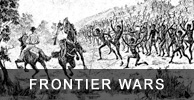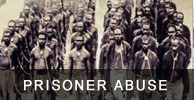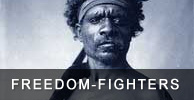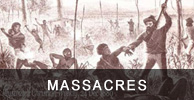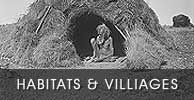War memorial battle over frontier conflict recognition
Broadcast: ABC TV '7.30 Report' 26/02/2009
Reporter: Matt Peacock
| Video - Windows Media | |
|
|---|---|---|
| Video - Real Player |
Transcript
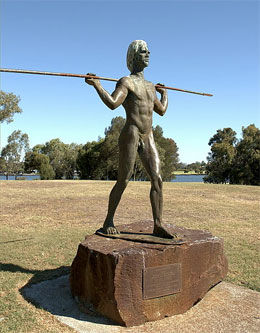
Click to enlarge
KERRY O'BRIEN, PRESENTER: The Australian War Memorial in Canberra is one of the country's most popular tourist destinations, featuring displace of Australian forces engaged overseas on combat or peacekeeping operations going back at least to the Boer War.
But late last year, the history professor Ken Inglis renewed a call for the War Memorial to recognise one conflict not commemorated - the fighting between Aboriginal people and the country's early colonial settlers. The official memorial response is that such fighting falls outside its charter, a claim that's disputed by some respected military historians and Aboriginal people.
Matt Peacock reports.
MATT PEACOCK: Australians come here in their thousands. Some to pay tribute, others to learn.
MICHAEL MCKERNAN, FMR DEPUTY DIRECTOR, AUSTRALIAN WAR MEMORIAL: It's a very special place for Australians because it tells of grief and it tells of sadness, it tells of achievement, it tells of bravery, and sacrifice.
MATT PEACOCK: The popular War Memorial in Canberra commemorates Australian military engagements spanning more than a century. The Boer Wars, world wars, Vietnam - just to name some. But one armed conflict is missing - fighting between the country's original inhabitants and its British settlers.
JOHN CONNOR, AUSTRALIAN DEFENCE FORCE ACADEMY: The Australian War Memorial is a magnificent institution and it tells, you know, the great history of the Australians in conflict, but it has this gap, and that is - that gap is the frontier.
BILL CREWS, PRESIDENT, RETURNED SERVICES LEAGUE: The Australian War Memorial commemorates the sacrifice of Australians on behalf of Australians. It's not to be engaged in what were skirmishes at the time of early colonial development.
GORDON BRISCOE, HISTORY, ANU: We are absolutely talking war here, and the end of the denial by the War Memorial would seek some peace by Aboriginal people.
MATT PEACOCK: Most historians agree many confrontations were war-like in nature, like the fighting just outside Sydney when, in the early days of the colony, Governor Macquarie sent troops to secure a disputed section of the Hawkesbury.
JOHN CONNOR: The people there thought it was a war. You have military officers who'd served in other parts of British Empire saying this was a war, that war had broken out on the frontier. You had the British Army being sent to the Hawkesbury. You had garrisons of British soldiers being kept there.
MATT PEACOCK: In his definitive Atlas of Australian Wars, the former Chief of Army and military historian Lieutenant General John Coates describes the frontier conflicts as a "brutal, bloody and sustained confrontation that took place on every significant piece of land across the continent."
GENERAL JOHN COATES: Really, you've got two groups of Australians who, in a sense, were involved in a low scale Civil War. I mean, we'd arrived in their country, and tried to brush them aside, and they didn't want to be brushed.
KEN INGLIS, HISTORIAN: That, from a trained historian who's also a Lieutenant General seems to me to put it almost beyond doubt and to make what I think is the case for that warfare being recognised by the Australian War Memorial.
MATT PEACOCK: History Professor Ken Inglis called for that at the launch of his book, Sacred Places, 10 years ago, a proposition the former prime minister John Howard quickly quashed.
JOHN HOWARD, PRIME MINISTER (archive footage, 1998): If you want to be legalistic about it, the state of war didn't exist. Now, I think the Australian War Memorial is to honour Aboriginal Australians and other Australians who died defending Australia.
GEOFFREY BLAINEY, HISTORIAN: I think warfare is a legitimate term to use. It's not about the whole relationship, but about certain periods.
MATT PEACOCK: Professor Geoffrey Blainey as far back as 1979 was asked for ideas about a War Memorial then open to the suggestion that the frontier conflicts might be included.
GEOFFREY BLAINEY: I thought that possibly at their suggestion, although I was quite happy with the idea that there should be a section on irregular warfare, whether the Eureka Stockade, conflicts between Aborigines and Europeans, the Vietnam War - which wasn't in the Australian War Memorial at that time.
MATT PEACOCK: Historian Dr Michael McKernan, then the deputy director of the Memorial, recalls that a change to its Act the following year made such recognition possible.
MICHAEL MCKERNAN: The Act was changed in 1980 to give coverage to all wars and war-like operations in which Australians have been involved. Really, I think, to give legitimacy to the Boer War, which of course is colonial troops in the first instance.
MATT PEACOCK: The amended Act read that Australia's military history was the history of "wars and war-like operations in which Australians have been on active service," and the Defence Force, which included, "… any military force of the ground raised in Australia."
MICHAEL MCKERNAN: That change in Act gave the opportunity for the much wider coverage, and that's when it began to be discussed about frontier conflict and the War Memorial.
BILL CREWS, PRESIDENT, RETURNED SERVICES LEAGUE: It would be our view that it is not appropriate to commemorate nationally and certainly not in the Australian War Memorial, despite the fact you may call it a war.
MATT PEACOCK: For the Memorial council member and president of the Returned Services League, Major General Bill Crews, frontier conflict just isn't on the agenda.
BILL CREWS: It hasn't been discussed in my time on the council in the last three years, but it was discussed almost 10 years ago and the Council decided it was inappropriate.
MATT PEACOCK: In 1999 the current director of the War Memorial, Major General Steve Gower, asked its military history section to investigate the idea. Although the director has refused to appear on this program, in a recent edition of the Memorial's Wartime magazine, he says the advice he received was, "… only police forces or British military unites were involved in the 'wars', whereas the Memorial’s charter calls upon it to commemorate Australia's military forces." The director concluded, "… there the matter rests." But does it?
Dr Peter Stanley, now with the National Museum of Australia, was the War Memorial's principal historian for three decades.
PETER STANLEY, NATIONAL MUSEUM OF AUSTRALIA: But the report demonstrates that there were other than British troops involved in this conflict with Aborigines on the frontier of settlement. It was a war fought by stockmen and settlers, and by convict overseers, but also by military Mounted Police who were recruited in Australia.
MATT PEACOCK: Does the director have a point, though? I mean, these were not Australian troops raised in Australia.
PETER STANLEY: I think he has a legal point, that is, that the troops were mainly not composed of Australians recruited in Australia. But the people they were fighting were Australians, they were Australian Aborigines, so this clearly is a war that belongs to Australia's history and we ought to recognise as such.
MATT PEACOCK: In fact, the advice the director received in 1999, which we have a copy of here, left the question open. He concluded there was little doubt that the frontier conflicts were a war or war-like operations, and although the British Army units used against Aborigines were not raised in Australia, the quasi-military police forces involved were. It concluded that if the war memorial wanted to interpret its Act in that way, it was legally free to do so.
BILL CREWS: Well, you've also got to look at the charter of the Memorial and basis on which it was established, and none of those lends themselves to the inclusion of these engagements back in the early colonial days. It's really as simple as that.
MATT PEACOCK: Charles Beans' original concept for the Memorial says the director in a statement was unquestionably concerned with external conflicts.
But the Memorial's refusal to commemorate early Aboriginal heroes, according to Professor Gordon Briscoe, is cultural racism.
GORDON BRISCOE: We want this recognised, redefined as a war of resistance against the British which was continued into the Australian period.
MATT PEACOCK: Within the War Memorial's walls an Aboriginal warrior appears as a stone carving alongside wombats and other native fauna. Examples of more recent Aboriginal service overseas are integrated into its general displays.
Interpretations of history, like the times, do change.
KEVIN RUDD, PRIME MINISTER: As Prime Minister of Australia, I am sorry.
MATT PEACOCK: One year on from the Prime Minister's historic apology to the Aboriginal Stolen Generations, say some historians, it might also be time to recognise an undeniable reality.
PETER STANLEY: We quite rightly recognise the great and good things that Australians have done in war, but we also ought to have the maturity to face up to the fact that Australians in the nineteenth century, some Australians, were involved in a nasty, protracted guerrilla war against the inhabitants of this continent.
GORDON BRISCOE: I dream about the day that we can look at some young child walking into the war memorial and seeing a representation that brings back the long fight of their people for their land.
KERRY O'BRIEN: Matt Peacock reporting from Canberra.

